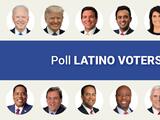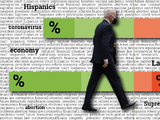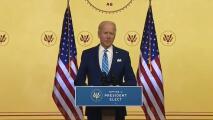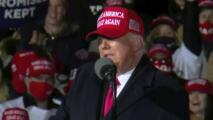A spectator democracy: Why do only 2 out of 10 people in the U.S. vote for mayor?

MIAMI, Florida. The top candidate in the Miami mayoral campaign, Francis Suárez, had breakfast with two colleagues on Thursday at Versailles restaurant, an emblematic meeting point for politicians located in the city's Little Havana neighborhood.
But, with only five days to go before Tuesday's election, he didn't bother to go around the tables to press the flesh and convince the undecided.
Waiters who attended him say he never mentioned that early voting had already begun. Nor were there any TV cameras or the usual gaggle of journalists and onlookers.
That's because Suárez is a sho-in for election on Tuesday.
One waiter, Armando Suarez (no relationship), says that in 30 years working at Versailles he had never seen so little interest in a campaign. "This year is the first time I haven't seen anything about the campaign," he says. "It's weird."
Miami is not the only city holding elections on Tuesday where almost nobody knows about the upcoming vote. Turnout is also likely going to be low in New York, Atlanta or Boston, among other cities. Voters in New Jersey and Virginia are also voting for their state assemblies and governors.
Turnout in the municipal elections of the 144 largest cities in the United States was only 21 percent of eligible voter in 2011 and the trend is downward, according to a study by the University of Utah. In 1999, the turnout was 24.9 percent.
The numbers are extraordinarily low if you look at what happens in large cities in Latin America and Spain. For example, in Mexico City in 2012, 67.4 percent of the electorate turned out to vote, in the Metropolitan District of Caracas in 2013, 58.6 percent and in Madrid in 2015, 69 percent.
Politicians and analysts warn that democracy should not be considered a spectator sport to be observed from the couch, because the right to vote is perhaps the quintessential indicator of civic engagement in a well-functioning democracy.
"When you have fought for democracy you hold it dear," says electoral expert Phil Keisling, observing that contrast.
U.S. apathy can also be observed when comparing voter turnout in national elections in the most developed countries. About 55.7 percent of the voting-age population in the United States voted in the 2016 presidential election, according to the Pew center based on Census data, a small uptick compared with 2012, but lower than the record year of 2008 (58.3 percent).
In Spain, 61.6 percent of the population eligible to vote tuned out in 2016, and in Mexico in 2012, 66 percent did so. The United States ranks 28th in electoral participation in the list of the 35 countries of the OECD organization (the club of rich countries).
There are many theories about the factors that best explain abstention, such as: media coverage, climate, competitiveness of a given campaign, or whether the vote coincides or not with a presidential election.
In some cases, such as Miami, the lack of interest may stem from the non-partisan nature of the election, which means that political parties aren't putting money into the race and voters feel less affinity with the candidates. The financial crisis of local newspapers is another factor that has reduced attention on municipal policies, experts say.
The lack of engagement may also be a consequence of the very low confidence in U.S. institutions, others warn.
"This is illustrative of a much deeper problem with American democracy," says Keisling, who as Oregon's secretary of state managed the state's elections between 1991 and 1999. "The danger of lower turnout is not only you empower the extremes, but also that it is less and less possible to have a sensible conversation."
Cynical millenials
One of the red flags is the very high apathy of millennials. A 2016 study by Portland State University shows that people over 65 vote in local elections on average seven times more than citizens between 18 and 34 years old.
Although it has long been observed that younger people participate less than older people, there's concern about the younger generations because they have become more cynical about the value of democracy as a political system.
Only three out of ten U.S. millennials consider "essential" to live in a democracy, according to the World Values Survey.
As in national elections, white people turnout at a much higher rate than ethnic minorities, particularly Latinos. Researchers from the Portland State University study, where 46 cities were analyzed, found that the Latino vote was half to two thirds of the average vote in each city.
Across the nation, one in 13 African-American adults also cannot vote because of a felony conviction. In Florida, Kentucky, Tennessee and Virginia, more than one in five African-Americans cannot vote.
Reduced participation has consequences for public policies that tend to forget minorities’ interests. "As absenteeism grows, the electorate looks less and less like the United States," says David Becker, founder of the Center for Election Innovation & Research, a group devoted to increase participation.
Among other actions to increase participation, experts propose to schedule local elections on the same day as national elections, to set the voting day on a Sunday instead of a working day, to send ballots by mail to all registered voters, as well as simplifying the ballots.
But experts regret that in many states authorities are promoting actions that limit voting instead of encouraging people to do so. Laws that require identification or gerrymandering (Districts’ redesign in order to subtract power from minorities’ vote and make people believe that voting is useless) are some examples.
While activists try to find solutions that increase turnout, a small number of people get to choose their local authorities. For Suárez, the Miami candidate, that means he can enjoy his breakfast at Versailles.
No polls have been done, but there's no doubt Suárez leads the race. He calls himself lucky enough to have more financial resources than his rivals, and to be the son of former mayor, Xavier Suárez - although he was embroiled in a scandal of electoral fraud in 1997.
"I don’t know about his plans, I’ll vote for him because I've known him all my life, he goes to Saint Raymond church, where I go too," says Mario García, a Versailles client.
In Miami’s most recent local elections, four years ago, turnout was only 12 percent. This year, they’re expecting the same number.
Trump draws attention away from local politics
Óscar Haza, a well-known radio and television journalist in South Florida, says the die is cast. Suárez' three opponents are: a communism sympathizer, Cynthia Mason Jaquith; a protestant minister, Williams Armbrister Sr.; and a young administrator with little experience, Christian Canache. "Suárez doesn’t have any competition. When there is less energy in the campaign, there are fewer elements of discussion that mobilize people to vote," he says.
Haza, who anchors a primetime show at a local TV station, recognizes that for the first time he has not interviewed all the candidates running for the mayor's office. "Trump doesn’t leave us space," he explained. On Nov 7 local elections will be held in three other Miami-Dade County municipalities: Hialeah, Miami Beach and Homestead.
At West Flagler library, in the heart of the city, a candidate for commissioner, Ralph Rosado, 45, waited for voters behind a barrier with other volunteers, but only a few retirees approached the voting center. Rosado, much younger than his voters, said he rather put his efforts into convincing the elderly, whom he calls "the supervoters."
He regrets that young people don’t have time to read newspapers and that many don’t understand how local politics affect them, often more than federal issues. "Someone recently told me that my opponents are not the other candidates, but apathy," he noted.



